- Home
- Giles Foden
Zanzibar Page 19
Zanzibar Read online
Page 19
‘Lone male,’ said Leggatt.
‘Come on,’ said Nick excitedly, and got to his feet.
The two of them rushed in like children, and started swimming out towards the leaping, diving shape. Miranda was expecting all the while that it would flee on the approach of humans. It didn’t. It came to greet them, swerving from side to side and then swimming under them. She reached out to touch it, imagining the feel of its skin on her fingertips – but then, with a flick of its tail, it was gone.
It returned minutes later, its snout breaking the surface just in front of her, emitting a crescendo of sharp clicks. She could see its rows of sharp teeth and the tip of a black tongue. Again she wanted to reach out, and again it vanished.
The dolphin stayed in the warm water near them for a good hour, circling or diving under the keel of the Churchill and then leaping wildly into the air – or retreating to fossick about at the edge of a reed bank nearer the shore.
‘I think he’s sulking,’ said Miranda, when it disappeared among the reeds.
‘Teasing you,’ Nick said, swimming up close behind her.
They trod water side by side. The dolphin blew and dived. Seconds later they saw it leap, far out now.
‘There he goes,’ Nick said.
‘I don’t know whether I like it or the sea horse best,’ she said, looking thoughtful.
‘Did you know that the male sea horse puffs out its chest to attract a mate?’ he enquired, assuming an air of innocence.
Miranda inclined her head, with its thick, dark hair, to one side, then pushed him playfully and began swimming to the shore as fast as she could. He followed a little later, cutting through the water in swift freestyle till he caught up with her.
They swam together round an outcrop of rock, till they came to a place out of view of Leggatt and Sayeed, who were still sitting by the fire.
Nick caught her heel as the beach shelved up, and the two of them began tumbling about in the shallows, wrestling and howling with laughter. She remembered the beach on the mainland, how he’d scooped her out of the rough water. She liked the memory, and she liked his touch now. Impulsively, she held his face and kissed him on the lips, then took his hand and dragged him out of the foam up on to the beach, where they lay down.
*
Later, they walked back round to the fire. Leggatt had boiled a kettle and was making tea.
‘You missed the fish eagle,’ he said, gruffly. ‘Sayeed threw a bit of fish up and she swooped down for it. Lovely sight.’
After tea, Nick and Miranda walked round the island together. He showed her the ruined cottage, with its record player and photograph of the British queen.
‘We could dance,’ he said, picking up one of the 78s and waving it at her.
‘You kidding?’
They came out and went over to the little mosque, which she said was neat. Then he led her up to the top of the lighthouse and explained how everything worked. Through its square, glassless window, they looked out over the island, to where the forest faltered down to a mess of rocks.
‘See those?’ said Nick, pointing to the rocks. ‘Just about near there, a little way out, there’s an underwater cave. I swam into it. You can breathe in there, and there’s writing on the wall.’
They started climbing down the steps. ‘What kind of writing?’
‘I don’t know. Arabic maybe. I must ask Leggatt.’
She liked being near him. It felt natural, strolling back along the beach, for him to hold her hand in his.
He pointed up ahead. ‘There’s a turtle nest over there somewhere. I saw the females lay their eggs when I was last here. In the moonlight.’
‘I can’t see anything.’
‘You’re not meant to.’
‘What the hell –?’
He broke into a run. In front of her, where he had indicated, she caught sight of a winding green shape and froze. The snake was using its body to flick up sand. It was a very peculiar movement, a kind of drilling action, as if it were a corkscrew or mechanical worm. The sand came up in a wide, fine fan. Nick was approaching the place, but when he was about three foot away, he changed direction. He began jogging away to the right, towards a scrubby dune bank at the edge of the beach. The snake was still twisting in the sand. She saw Nick break a branch off a weatherbeaten bush that looked like a candelabrum.
Coming back down onto the beach, he returned to the nest, forked branch in hand. The snake was still twisting away. It seemed relentless. Then it suddenly stopped: the white domes of the eggs, four or five of them, were partially visible. The snake changed its position, curling round so that its head faced the eggs. Then it became aware of Nick, who was bearing down on it, holding out the branch. He seemed to stumble as he came down the bank. Miranda turned pale.
The hinged mouth was opening, ready to bite and squirt out venom. But already he was on it, pinning it down with the V of the broken branch before it could do anything, pressing the fork hard into the sand. She cried out again, but Nick, unfazed, was bending down. The snake’s tail slapped against his calf. Then, watchful, he caught it tightly between finger and thumb and lifted it up. He held it away from him gingerly, at arm’s length, its tail thrashing. She watched him begin walking back up towards the treeline, and she felt both impressed and angry at his foolhardiness.
Then she smelt pipe smoke, and heard a voice.
‘I think he’ll find that’s a mamba.’
It was Leggatt.
‘Not terribly good eating, I’m afraid,’ he added, languidly. ‘But very poisonous. Perhaps the most venomous on these islands.’
The two figures stood side by side in the open ground of the beach, Leggatt in a stained canvas jacket and a peaked sailor’s cap of indeterminate authority, Miranda in trainers, shorts and a cotton blouse. Nick was up beyond them, on the crest of the dune. With the underarm action of a bowler, he tossed the writhing snake into the scrub.
‘I rather wish he had despatched it more permanently,’ observed Leggatt. ‘Those things will hunt a man down. I’d be surprised if it doesn’t make an attempt to follow him.’
He removed his pipe from his mouth and shouted up towards the dunes. ‘Don’t hang about, old boy!’
She lifted a hand to shield her brow. Nick was silhouetted against the skyline. He seemed to have heard Leggatt’s warning, but didn’t quicken his pace.
Leggatt walked over to the eggs and began scuffing sand back on top of them with his shoe.
‘Anyway,’ he said, ‘it will only be back at nightfall to dig these up. We’ll fight them on the beaches. Ha!’
Miranda was irritated by the old man’s manner. Having felt it was stupid at the time, she now experienced a glow of admiration, pride even, at what Nick had done. All the same, when he joined them, she chided him.
‘That was foolish. Mr Leggatt says they are very dangerous.’
‘Not as dangerous to us as they are to turtles,’ said Nick, grinning.
‘I think that’s the most wrong-headed thing I ever heard,’ said Leggatt.
He tapped out his pipe on a rock, making a shower of angry red sparks.
‘Anyway, what you did was pointless. I was just saying, to the young lady here, that that creature will be back during the night. Or one of its chums. You should have killed it.’
Nick looked dismayed. ‘Is there nothing we can do?’
‘Part of me feels one should just let nature take its course. But if you insist, we’ve got two choices. Either we move the eggs, which raises the question of where we put them, not to mention the likelihood of disturbing their hatch. Or we build a fence around them, which means we have to guess when they are going to hatch and come and dismantle it before they do.’
After some discussion, they settled on the fence option, and started gathering up driftwood. Once they had enough, they drew a circle round the nest, of about a metre in diameter, and began driving in the crooked stakes. Nick added some rocks, and in the end they made a pretty nice little pali
sade.
Or so Miranda thought in any case. Leggatt remained pessimistic about the chances of the baby turtles.
‘I still don’t think those little fellows are going to see the light of day,’ he said, lugubriously.
He took off his cap and wiped the sweat from his forehead with the back of his wrist. ‘It’s hard enough for them anyway, with gulls and rats, and fish in the water … Well, I suppose we should be wending our way.’
‘Before we do,’ said Nick, as they walked back towards the fire, ‘there’s something I wanted to ask you.’
‘Yes?’
‘I found a cave.’
Leggatt gave him a penetrating look. ‘So, you found, that did you?’
‘I was diving round the edge of the island and went into it. There seemed to be an opening to the surface but I haven’t been able to find it. There was writing inside, too. I think it might have been Arabic.’
‘Thought it was my secret. Come on then, I suppose I can show you. We’ll need a panga though.’
He went over to the dinghy and, after fetching the machete, began cutting a path through the deep bush. Nick and Miranda followed him, stepping over broken ferns and branches. After about ten minutes they came to an outcrop of rock.
‘This is the opening,’ said Leggatt. ‘Well, one of them anyway. There’s a couple of holes elsewhere that plunge straight down into the system, but this is the only one you can actually get through without breaking a leg. I don’t think we should go in without proper lights.’
‘The system?’ queried Nick. ‘You mean there’s more than one cave?’
‘Certainly. There’s a whole network down there.’
He cleared away undergrowth to reveal the ragged entrance. ‘Pretty nasty story actually. One of the sultans used to keep escaped slaves on this island. They threw them down the hole as a punishment if they tried to escape again.’
‘But they couldn’t have done the writing, surely?’
‘I don’t know. Maybe. Some of the slaves were pretty accomplished. Clerks and so on. They weren’t all hewers of wood and drawers of water. I suppose it could have been a troublesome courtier who did it. Or it could be some kind of invocation. Anyway, we should be getting back.’
Returning to the beach in silence, they pulled the dinghy into the sea and got inside. Miranda felt subdued by the story of the caves. Still, it had been an exciting day. She watched Nick row, and wondered if she would miss him on her return to the mainland. She had to catch a flight very early in the morning if she was to get back to work on time.
Back on the yacht, Sayeed, who must have swum out, was scrubbing the deck. Miranda smiled at him brightly as she climbed up. But the whole idea of having an African servant made her feel uncomfortable.
Once the yacht got under way, she shared a bottle of beer with Nick at the front of the boat. Leggatt had taken up his position back in the wheelhouse. The sun was beginning to set. In the distance, some way to starboard but at an angle, they could just make out the white fuzz of another craft. It was moving swiftly.
‘Probably customs,’ said Nick.
‘Hey,’ he added, reaching into the pocket of his shorts. ‘I picked up this for you on the dune.’
He handed her an object, about the size of a take-out coffee lid and almost as weightless. It was the empty shell of a baby turtle.
‘A keepsake,’ Nick said.
She held it up to the dying sun. It was exquisite, amber light gathering in the delicate, serrated layers.
‘Do you think…?’ She didn’t need to tell him that she was thinking of the snake.
‘Not necessarily. Birds take them too.’
She pulled a face. The thought of a bird’s beak pecking the flesh of such a tiny creature was just as horrible to contemplate.
‘It is a beauty, isn’t it?’ said Nick, a little too encouragingly. ‘Keep it.’
She put the shell in her bag. His enthusiasm was slightly off-putting. But he was, she thought, looking kind of handsome in the evening sunlight, and she responded when he leaned over and kissed her.
At that moment, with a slight jolt, they suddenly changed direction. Miranda and Nick heard Leggatt swear. Looking up, they saw that the boat they had spotted earlier was coming towards them. Drilling powerfully through the water, it was a sleek white motor cruiser with a covered cabin.
They heard Leggatt again. ‘What the hell are these buggers playing at?’
About twenty metres away from them, the cruiser suddenly veered sharply and cut its throttle. The wake rocked the Winston Churchill. Leggatt clattered out of the wheelhouse and started waving his arms about, cursing. There was no response from the cruiser, whose engine spluttered in the water. Through the glass of its cabin, Miranda could see three faces – all dark-skinned, but only one who could be said to be African – observing her in their turn. She picked up her camera and used the zoom to get a closer look. One of the men, she noticed, had a pencil moustache and a long thin face; another was much bigger and beefier than his companions; the third was the African one, who was also younger. Almost unconsciously, she put her finger on the shutter. Focusing on the man with the moustache, she was just about to take a picture when he pulled a curtain across the window of the cabin. Then, its engine gunning up loud and quick, the cruiser moved off again.
‘What was all that about?’ Nick asked Leggatt, who was watching the cruiser through binoculars.
‘I haven’t a clue, but I’m sure as dammit going to come out tomorrow and see what they’re up to, since they seem to be heading for Lyly.’
The journey back, in a low swell, was otherwise uneventful. It was dark by the time they arrived at Leggatt’s farm, and Miranda wondered how they would be able to dock. But even with no visible shore lights, the old man was able to steer them alongside the jetty. Sayeed jumped out with a flashlight. After mooring, he pulled down the rope ladder on the side of the yacht. Nick and Miranda climbed down carefully while the young Zanzibari played the beam over their feet. Then Leggatt lit a storm lamp and Sayeed began unloading the gear while Leggatt went into his house to start the generator.
Miranda and Nick stood on the jetty in the warm night air, which was filled with the smell of cloves from the barns.
‘I’ve really enjoyed myself these past few days,’ she said – feeling, all the same, oddly hollow.
No reply came, only Nick let his hand drop down between them both to find hers. They heard the thump of the generator. The house lights went up, and then a line of bulbs, fixed to posts along the jetty. Further up, nearer to the house, they saw the black outline of a table, with a single chair next to it.
‘That’s a lonely sight,’ said Nick, and they began walking towards it. He squeezed her hand.
His observation, and the action that went with it, seemed designed to ask for more of a response than Miranda felt appropriate. She remembered when he first started emailing her the tone of his messages had also been somewhat like that – lacking a little in social graces. But then, she thought, emails did change the rules. There was something about them which provoked a condition of intimacy before it was valid. They beckoned one on, inviting risk, drawing back the veil of personality further with every exchange …
Her thoughts were interrupted by the noisy arrival of Leggatt, carrying a bottle and shot glasses on a tin tray. He was shouting for Sayeed to fetch two more chairs from the veranda.
‘Thought we’d have a little drink out here. I usually do of an evening. Next time you come over,’ he said to Miranda, confidingly, ‘you might do me the favour of bringing a bit of this. Johnnie Walker, if you can.’
Unusually cheerful – Miranda suspected his grouchiness was partly an act – Leggatt filled and then handed her one of the little glasses.
‘Because it’s my firm belief that when a body wants to lay down of a night, a drop of Johnnie keeps the demons away. I can only get it on the mainland though. Talking of demons, did I tell you about the papabawa, Nick? That’s what they call t
he Zanzibar vampire. It’s pretty much like your common or garden Draculatype vampire, except that it’s got white skin and lives in the clove orchards. Where is he with those chairs?’
He was silent for a second, pipe clenched between his teeth as he concentrated on filling his and Nick’s glasses.
‘You will have heard some of the locals call us muzungu. Well, they also call us papabawa. There must be a lesson there, though what it is I couldn’t say. Here you go.’
Nick took the whisky from him, and immediately put it down on the table so he could unwrap a packet of Marlboros.
‘I’ll leave you guys to have your smoke,’ Miranda said.
‘It’s my first all day!’ Nick exclaimed.
‘It’s not a problem. Just …’
Sipping her drink delicately, she moved away a little from the two men. Leaning her thighs on the jetty railing, she looked out over the dark expanse of the ocean. She could hear its melancholy roar and also, ear-close, the faint squeal of mosquitoes.
‘What do you think they were up to, those guys in the boat?’ she heard Nick say. ‘It didn’t look like the kind of craft your average poacher could afford.’
Sayeed was making his way over from the house with the other chairs.
‘No …’ Leggatt sucked loudly on his pipe. ‘It certainly didn’t. We should go out tomorrow and see what they were about. Don’t drag them, Sayeed.’
‘Can’t do it tomorrow. I’ve got to take Miranda to the airport … Hey, you OK?’
‘I’m fine,’ she replied, over her shoulder. ‘Just thinking. Last day of my vacation is all.’
‘Time’s wingèd chariot,’ Leggatt intoned. ‘Are you going on the Cessna or the Beechcraft?’
‘I’m not sure,’ she said. ‘The Air Rafiki one.’
‘I see.’ Leggatt didn’t elaborate further, but it was clear he disapproved.
Not that Miranda was really paying attention anyway. Pensively apart, she was listening to the waves lapping against the stanchions of the jetty and, further away, the wider sound of breakers on open sand or reef. Leggatt said something in Swahili to Sayeed. She felt the jetty bounce, heard the wooden boards creak as the boy ran behind her.

 The Last King of Scotland (1998)
The Last King of Scotland (1998) Zanzibar
Zanzibar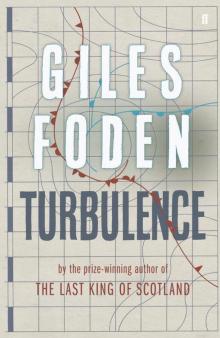 Turbulence
Turbulence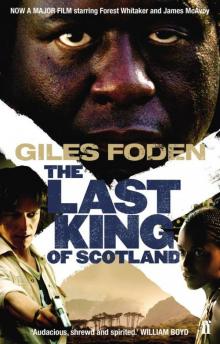 The Last King of Scotland
The Last King of Scotland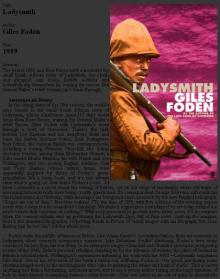 1999 - Ladysmith
1999 - Ladysmith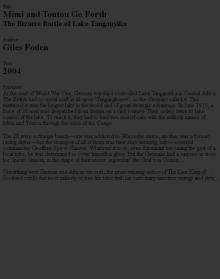 2004 - Mimi and Toutou Go Forth
2004 - Mimi and Toutou Go Forth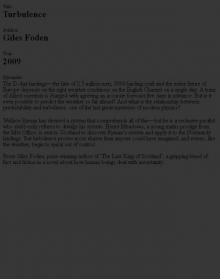 2009 - Turbulence
2009 - Turbulence